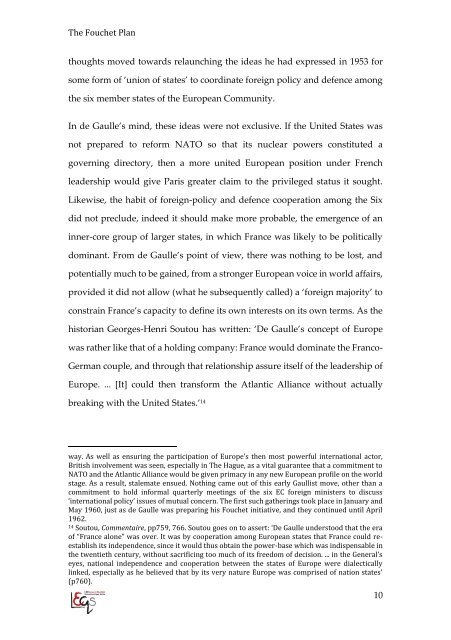The Fouchet Plan De Gaulle’s Intergovernmental Design for Europe
n?u=RePEc:eiq:eileqs:117&r=cdm
n?u=RePEc:eiq:eileqs:117&r=cdm
You also want an ePaper? Increase the reach of your titles
YUMPU automatically turns print PDFs into web optimized ePapers that Google loves.
<strong>The</strong> <strong>Fouchet</strong> <strong>Plan</strong><br />
thoughts moved towards relaunching the ideas he had expressed in 1953 <strong>for</strong><br />
some <strong>for</strong>m of ‘union of states’ to coordinate <strong>for</strong>eign policy and defence among<br />
the six member states of the <strong>Europe</strong>an Community.<br />
In de <strong>Gaulle’s</strong> mind, these ideas were not exclusive. If the United States was<br />
not prepared to re<strong>for</strong>m NATO so that its nuclear powers constituted a<br />
governing directory, then a more united <strong>Europe</strong>an position under French<br />
leadership would give Paris greater claim to the privileged status it sought.<br />
Likewise, the habit of <strong>for</strong>eign-policy and defence cooperation among the Six<br />
did not preclude, indeed it should make more probable, the emergence of an<br />
inner-core group of larger states, in which France was likely to be politically<br />
dominant. From de <strong>Gaulle’s</strong> point of view, there was nothing to be lost, and<br />
potentially much to be gained, from a stronger <strong>Europe</strong>an voice in world affairs,<br />
provided it did not allow (what he subsequently called) a ‘<strong>for</strong>eign majority’ to<br />
constrain France’s capacity to define its own interests on its own terms. As the<br />
historian Georges-Henri Soutou has written: ‘<strong>De</strong> <strong>Gaulle’s</strong> concept of <strong>Europe</strong><br />
was rather like that of a holding company: France would dominate the Franco-<br />
German couple, and through that relationship assure itself of the leadership of<br />
<strong>Europe</strong>. ... [It] could then trans<strong>for</strong>m the Atlantic Alliance without actually<br />
breaking with the United States.’ 14<br />
way. As well as ensuring the participation of <strong>Europe</strong>’s then most powerful international actor,<br />
British involvement was seen, especially in <strong>The</strong> Hague, as a vital guarantee that a commitment to<br />
NATO and the Atlantic Alliance would be given primacy in any new <strong>Europe</strong>an profile on the world<br />
stage. As a result, stalemate ensued. Nothing came out of this early Gaullist move, other than a<br />
commitment to hold in<strong>for</strong>mal quarterly meetings of the six EC <strong>for</strong>eign ministers to discuss<br />
‘international policy’ issues of mutual concern. <strong>The</strong> first such gatherings took place in January and<br />
May 1960, just as de Gaulle was preparing his <strong>Fouchet</strong> initiative, and they continued until April<br />
1962.<br />
14 Soutou, Commentaire, pp759, 766. Soutou goes on to assert: ‘<strong>De</strong> Gaulle understood that the era<br />
of “France alone” was over. It was by cooperation among <strong>Europe</strong>an states that France could reestablish<br />
its independence, since it would thus obtain the power-base which was indispensable in<br />
the twentieth century, without sacrificing too much of its freedom of decision. ... in the General’s<br />
eyes, national independence and cooperation between the states of <strong>Europe</strong> were dialectically<br />
linked, especially as he believed that by its very nature <strong>Europe</strong> was comprised of nation states’<br />
(p760).<br />
10


